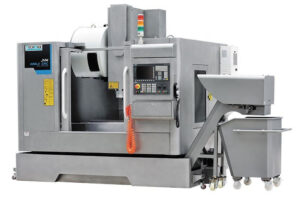The Fascinating World of CNC Machines: How They Work and What They Can Do
 CNC machines have revolutionized the manufacturing industry, making it possible to produce complex and precise parts with ease. But how do these machines work? In this post, we’ll take a closer look at the inner workings of CNC machines and explore their capabilities.
CNC machines have revolutionized the manufacturing industry, making it possible to produce complex and precise parts with ease. But how do these machines work? In this post, we’ll take a closer look at the inner workings of CNC machines and explore their capabilities.
What is a CNC Machine?
CNC stands for Computer Numerical Control. A CNC machine is a computer-controlled machine tool that can perform a wide range of operations, such as cutting, drilling, milling, and turning. The machine is programmed using a computer-aided design (CAD) software, which generates a set of instructions that the machine follows to produce the desired part.
How Does a CNC Machine Work?
The first step in using a CNC machine is to create a design using CAD software. Once the design is complete, the software generates a set of instructions, known as G-code, that the machine will follow. The G-code tells the machine where to move, how fast to move, and what operations to perform.
The machine is equipped with a cutting tool, which is mounted on a spindle that can move in multiple directions. The spindle is controlled by a series of motors that are connected to the machine’s computer. The motors move the spindle and cutting tool along the X, Y, and Z axes, allowing the machine to cut and shape the material.
The material is held in place on a worktable, which can also move along the X, Y, and Z axes. This allows the machine to cut the material from different angles and positions, creating complex shapes and contours.
What Can a CNC Machine Do?
CNC machines are incredibly versatile and can be used to produce a wide range of parts and products. Some of the most common applications include:
- Precision machining: CNC machines can produce parts with incredibly tight tolerances, making them ideal for applications that require high precision and accuracy.
- Prototyping: CNC machines are often used to create prototypes of new products, allowing designers to test and refine their designs before moving into full-scale production.
- Mass production: CNC machines can produce large quantities of parts quickly and efficiently, making them ideal for mass production applications.
- Customization: CNC machines can be programmed to produce parts with unique shapes and designs, making them ideal for customization applications.
Conclusion:
CNC machines have revolutionized the manufacturing industry, making it possible to produce complex and precise parts with ease. By using CAD software to generate G-code, these machines can perform a wide range of operations, from cutting and drilling to milling and turning. With their versatility and precision, CNC machines are sure to play a vital role in the future of manufacturing.






